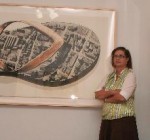Art embargo

Although the state of Florida won’t let her, Noel Smith wants to travel to a “terrorist state.”
Smith, the curator of education at USF’s Graphicstudio, is one of the plaintiffs in a lawsuit filed by the American Civil Liberties Union contesting a newly created bill called the “Travel Act.” The bill, according to the ACLU, prohibits state, federal and private funds for travel to nations considered terrorist states, as designated by the U.S. Department of State.
Rep. David Rivera (R-Miami), who headed the bill, did not return messages given to his assistant Wednesday, but did do an interview with the Orlando Sentinel and commented on the bill.
“I don’t think Florida taxpayers want their public resources being used to subsidize trips to terrorist countries,” Rivera said. “We’re engaged in a hot war against terror.”
One of the “terrorist states” listed is Cuba, a country Smith regularly visits for her involvement with Graphicstudio. As part of the College of Visual and Performing Arts’ Institute for Research in Art, Graphicstudio brings in contemporary artists from around the world and gives them studios to produce their artwork.
Last year, Graphicstudio had approximately $1 million in artwork sales.
“Our success really depends on our being on the cutting edge of art,” Smith said. “We always want to be working with the most interesting artists, the most accomplished artists, and it so happens that Cuban artists are really, really good artists.”
Smith said she was contacted by the ACLU because of her regular trips to Cuba, and agreed to be named as a plaintiff.
“I felt it was very important to protect our work here at Graphicstudio and the Institute,” Smith said. “And to protect the idea of academic freedom.”
All of the plaintiffs are university officials and faculty members, including some from the University of Florida, Florida International University and the University of Central Florida. Most are contesting the bill’s banning of travel to Cuba in particular.
Although Cuban artists are allowed to come to the United States, Smith said the process of getting a visa is a difficult one.
“They have a tough time getting visas, – it’s not Cuba that’s keeping them from coming,” Smith said. “It’s the U.S. that’s keeping them from coming.”
As part of providing studios for foreign artists, Graphicstudio insists they teach and work with USF students. One Cuban artist, Abel Barroso, taught a class at USF and as a class project, his students produced works that had to do with Sept. 11.
“We make sure the artists interact as much as they possibly can with the students,” Smith said. “I mean, that’s why we’re here, we’re here for the students. Everything we do is for the University community.”
Francisco Gramage, a senior majoring in studio art, was an intern with Los Carpinteros, a group of Cuban artists.
“It was a great opportunity,” Gramage said. “To see the way they explored ideas – I think it helped me evolve as an artist.”
Besides the inspiration he received, Gramage also went along with Los Carpinteros to Cuba, and was given the nickname of “Pana” by the artists – a word that roughly translates to “buddy.”
Marco Castillo and Dagoberto Rodriguez are the two members of Los Carpinteros, whose artwork has been traveling across the country and is now on exhibition at the Cincinnati Contemporary Arts Center.
“That is part of our involvement with Cuba for the Institute of Research in Art,” Smith said. “We’ve also had other exhibitions of Cuban art that have traveled through the country; we’ve brought other artists.”
Smith, who has been traveling to Cuba and recruiting artists since 1999, said the Travel Act could hinder Graphicstudio’s research ability.
“In the overall picture, one of our important areas of research is Cuban art, and if we lost the capability of freely pursuing that research, it’s ultimately going to have a deleterious effect on our research,” Smith said.
Gramage said he received something he couldn’t otherwise from his time with Los Carpinteros.
“Opening up your mind to another culture, another way of doing things,” Gramage said. “That’s what I got out of it.”






